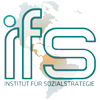
Looking for a World in Balance: The “Inclusivity Index”, the Magical Square of the Great Transformation or How to Build a Social Strategy for the Global Civil Society
In this article, Ulrich Hemel proposes the concept of an "inclusivity index" as a tool for assessing and improving development...

Mitgliederversammlung des Vereins
Mitgliederversammlung (digital) des Vereins „Institut für Sozialstrategie e.V.“ Ort: Tübingen (digital)Zeit: 4. März 2024, 18.00-19.30h Tagesordnung: Begrüßung Jahresbericht 2023 Finanzbericht ...

Die Zukunft der Arbeit, digitale Transformation und Werteorientierung
Abstract [en]: Digital Transformation is rapidly gaining speed, also due to the Covid-19 pandemia. Changes in the field of labor,...

What is Digital Fairness?
Abstract [en]: 1. Respect for Informational Self Determination, 2. Digital Reciprocity, 3. Transparency, 4. Traceability, 5. Regulated Expiration Date, 6....

Newsletter No. 8
April 2012 no08_ifs-newsletter_1204 Liebe Freunde und Freundinnen des Instituts für Sozialstrategie, durch das Internet und die darin entstehenden sozialen Gruppierungen...

Newsletter No. 6
Juni 2011 no06_ifs-newsletter_1106 Liebe Freunde und Freundinnen des Instituts für Sozialstrategie, unser Ziel ist ein Beitrag zur Gestaltung der globalen...

Newsletter No. 4
Mai 2010 no04_ifs-newsletter_1005 Liebe Freunde und Interessenten des Instituts, auch in den letzten Monaten hat sich das Institut trotz bescheidener...

Newsletter No. 3
März 2010 no03_ifs-newsletter_1003 Liebe Freunde und Interessenten des Instituts, liebe Teilnehmerinnen und Teilnehmer! gerne informiere ich Sie und Euch über...
